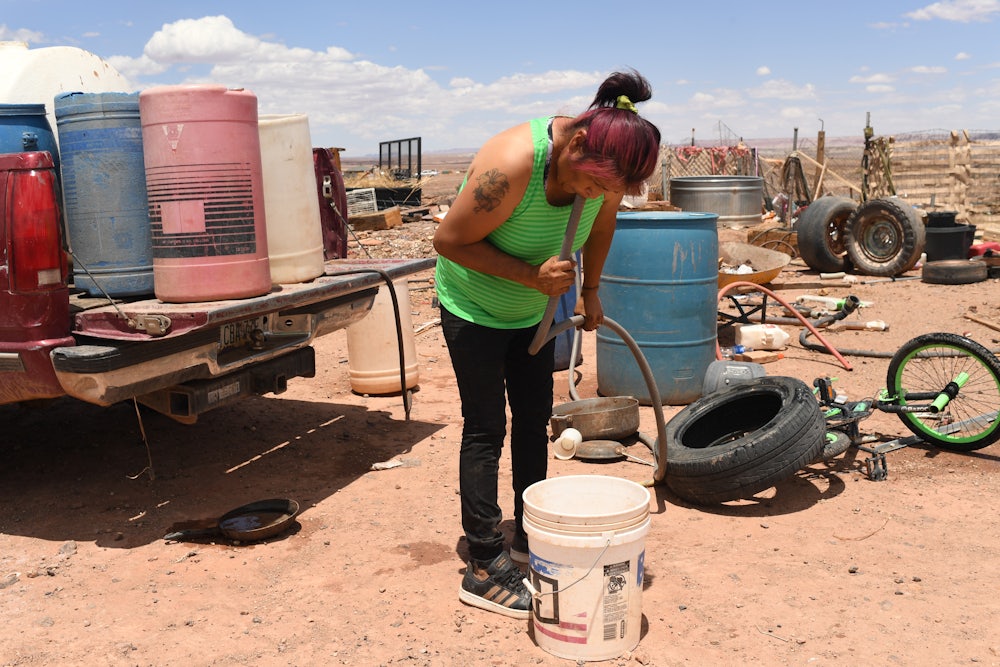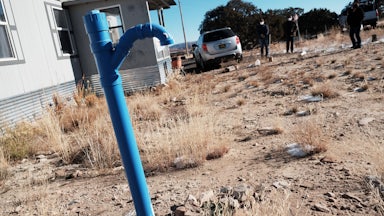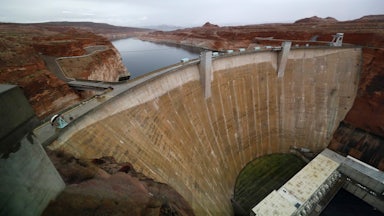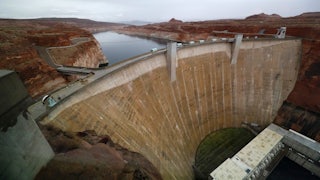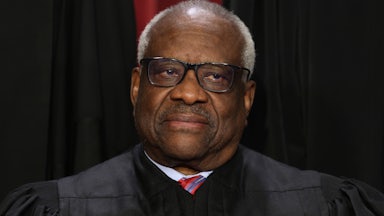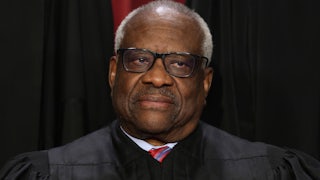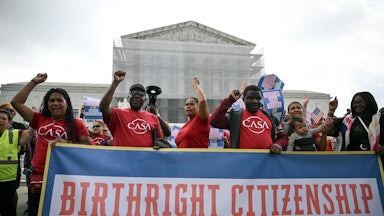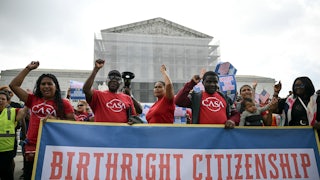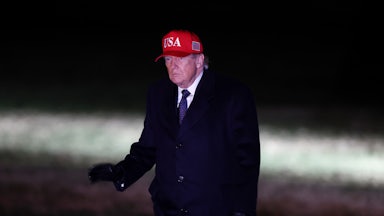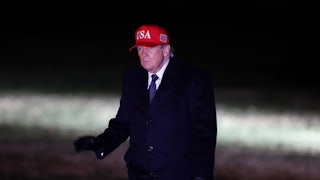The Supreme Court appeared to lean toward allowing a lawsuit about the Navajo Nation’s treaty rights in the Colorado River watershed to proceed during oral arguments on Monday. But the potential majority is a narrow one, with Justice Amy Coney Barrett likely casting the decisive vote, and the final ruling may ultimately tilt back toward the federal government.
At issue in the case of Navajo Nation v. Arizona is the complex legal arrangement that decides how water is allocated from the Colorado River—and the series of decisions that omitted the Navajo Nation from it. The watershed is the most important and contentious supply of freshwater in the Western United States, and questions over how much water each of the states and tribes receives have only grown after decades of drought and the rising threat of climate change. It is also of vital importance for the Navajo Nation itself, where obtaining drinkable water can mean an hours-long journey through the desert.
The tribe, for its part, says that the federal government broke a promise to guarantee water rights for the tribe that it made when Navajo leaders agreed to move to a reservation in northern Arizona in the late nineteenth century. Frederick Liu, a Justice Department lawyer who argued on behalf of the United States, said that while the federal government has a “moral and political responsibility” to help the Navajo Nation get access to water, it does not have a legal duty to do so.
“Just as the 1868 treaty didn’t impose on the United States a duty to build roads or bridges or to harvest timber or to mine coal, the 1868 treaty didn’t impose on the United States a duty to construct pipelines, pumps, or wells to deliver water,” he argued. “Those affirmative duties aren’t part of the treaty, and because the government has never expressly accepted those duties, the Navajo Nation’s breach-of-trust claim can’t proceed.”
That position drew some consternation from Justice Neil Gorsuch. The court’s only Westerner has carved out an unusual niche for himself when it comes to holding the federal government accountable for the promises made to Native American tribes in the eighteenth and nineteenth centuries. He took issue with the Justice Department’s assertion that the treaty did not make a judicially enforceable pledge to the Navajo Nation in 1868.
“Let’s say, as a matter of state contract, I promise you a permanent home and that you’ll be able to raise animals there and you’ll be able to conduct agriculture there,” Gorsuch asked Liu. “Would it not be a breach of contract to then provide a home where none of those things is possible? Is that a permanent home?”
“I don’t think you would be able to bring a breach of contract claim,” Liu started, before Gorsuch interrupted him. “Really?” the justice asked. “You don’t think that’s a breach of good faith and fair dealing?”
For the Supreme Court itself, Colorado River disputes fall under the terms of Arizona v. California, a long-running water rights dispute in the mid-twentieth century. The federal government intervened in that case on behalf of five tribes in the region to vindicate their water rights. A separate case, Winters v. United States, holds that the government has a trustee relationship over tribal water rights even when they are not explicitly laid out by treaties or in federal law.
The federal government, however, chose not to intervene on behalf of the Navajo Nation during that litigation and later opposed the tribe’s efforts to take part in the case. The court’s eventual ruling in Arizona v. California left the door open for tribal governments to sue to affirm their own water rights in the Colorado River watershed in the future if they weren’t included in the original settlement. The Navajo Nation sued the federal government for breach of trust in 2002 for not defending its water rights in the matter, prompting the current litigation. Arizona and two other Western states later intervened to vindicate their own rights.
While Gorsuch is the most vocal justice on the court when it comes to Indian law, Barrett’s questions may be more instructive about how the case will be decided. Chief Justice John Roberts and Justices Clarence Thomas, Samuel Alito, and Brett Kavanaugh appeared skeptical of the tribe’s ability to bring the lawsuit during Monday’s oral arguments. Gorsuch and the court’s three liberals—Justices Sonia Sotomayor, Elena Kagan, and Ketanji Brown Jackson—seemed willing to side with the tribe.
Barrett, who would cast the crucial fifth vote under that breakdown, appeared skeptical of the Justice Department’s argument that the lower court ruling in the Navajo Nation’s favor would run counter to the Supreme Court’s own settlement of the issue in Arizona v. Colorado. “Why would resolving this dispute be at odds with the decree?” she asked Liu at one point. “Because it sounds to me like what you’re saying is that they could get water from places other than the mainstream.”
In an exchange with Shay Dvoretzky, who argued on behalf of the Navajo Nation, she also noted that the tribe’s request was narrower than its critics had suggested and didn’t involve mandates to build pipelines, as some of her colleagues had suggested. “That’s really just about intervening in litigation to assert those on the Navajo’s behalf and to protect them, right?” she said. “Like to safeguard those rights so that you’re not deprived of them, as Justice Gorsuch was pointing out, the Navajo haven’t had an opportunity in Arizona v. California or any other time to assert those Winters rights and to have any rights in the mainstream adjudicated.”
The Supreme Court is no stranger to high-profile disputes over tribal sovereignty and treaty rights in recent years. In October, the justices heard oral arguments in Haaland v. Brackeen, a complicated fight over the constitutionality of the Indian Child Welfare Act, or ICWA. A coalition of Republican-led states and non-Native prospective adoptive parents hopes to strike down portions of the law that require state courts to give preference to other Native families when finding foster and adoptive parents for Native children. Tribes have argued that the law is necessary to preserve their cultural identity and their long-term survival.
The court’s ruling in both cases this term could have a significant impact on, respectively, Western water disputes and adoptions for Native children. Beyond those contexts, the rulings will also be an important marker for how the court currently thinks about tribal sovereignty and tribal issues. The court took one of its boldest steps in vindicating the rights of a tribal government in more than a generation in the 2020 case McGirt v. Oklahoma, when it ruled that most of eastern Oklahoma was still Indian country because Congress had never completely disestablished the reservations that had existed there.
That five-justice majority in McGirt came from Gorsuch and the court’s four liberals. After Ruth Bader Ginsburg’s death and Barrett’s confirmation to replace her later that year, however, the balance appeared to shift. Barrett later sided with the four McGirt dissenters in a follow-up case, Oklahoma v. Castro-Huerta, where the high court gave states broad latitude to prosecute crimes in Indian country despite 200 years of precedent to the contrary. Gorsuch, writing in a lacerating dissent this time, denounced the majority’s opinion as “an embarrassing new entry into the anticanon of Indian law.”
Did Castro-Huerta reflect a deeper shift against tribal sovereignty at the Supreme Court among its current members? Or was it merely a one-time-only consolation prize to the state of Oklahoma after its leaders fumed about the loss of sovereignty and a supposed breakdown in law and order after the McGirt ruling? A clearer answer to those questions—and where Barrett in particular will fall on them—will come when the court releases its opinions for this term by the end of June.
